
Stanisław Ignacy Witkiewicz, photography.
“Ironically, however, certain sections of affluent Western society have refined their growing obsession with cleanliness and hygiene to such an extent that it threatens to become outrightly unnatural and unhealthy. In North America in particular, germs are reviled and attacked with the kind of vigilant disgust and aggression which older eras reserved for their religious or racial enemies. The children of middle-class parents will have their mouths habitually swabbed with antiseptic wipes, or be forcibly prevented from sharing drinking cups. So thoroughly oversanitised is the general environment of many modern infants that they lack even the bare minimum of dirt needed to develop an efficient immune system. With their basic bodily defence systems eroded by this well-meaning germ warfare, such children will be far more likely to develop allergies or asthma in later life.”
Richard Sugg
“Throughout the recorded history of language the movement of meaning has been from concrete to abstract.”
Owen Barfield
“Subjective consciousness, if it is not reducible to something physical, … would be left completely unexplained by physical evolution—even if the physical evolution of such organisms is in fact a causally necessary and sufficient condition for consciousness.”
Thomas Nagel
“Although the release of bodily waste is fundamentally an involuntary, organic process, our parents and society have taught us that bodily functions are dirty and disgusting. Society later uses the internalized anxieties surrounding bodily functions to teach children to deny and repress other instinctual drives. While it may be useful up to a point for children to conform to the expectations of others, most of us become slaves to a set of unconscious conditioned reflexes which not only hold us back but cause us a lot of grief and even harm. Under the influence of yajé, it is suddenly easy to understand Wilhelm Reich’s concept of “body armoring.” Reich argued that our neuroses stem from internalizing psychic shocks experienced in early childhood. Whenever we are punished, through words or blows, for expressing our instinctive natures, our body instinctively protects itself by forming body armoring.”
Jimmy Weiskopf ( Yaje: The New Purgatory )
“The question is not whether we will have a surveillance state in the years to come, but what sort of surveillance state we will have.”
Jack Balkan, 2008
I have often said (and probably am stealing from Murray Mednick here) that theatre is a form of knowledge. One could also say it is a form of being, or a form of thinking. All are true, with some qualifications. And while it is true that theatre represents a very unique form of artistic expression, these same ideas exist in some way for painting, architecture, film and literature. In mediums other than theatre, however, there has grown up over time, I think anyway, more intractable obstacles to a proper listening and seeing. I have written rather a lot about this idea of contemporary unreality and I find others have done so as well (Ed Curtain, C.J. Hopkins, John Eskow and others). The inundation of mass electronic propaganda has reached unprecedented levels. And I think with the obvious deleterious political conditioning there comes something else, and something with perhaps an even longer lasting influence.
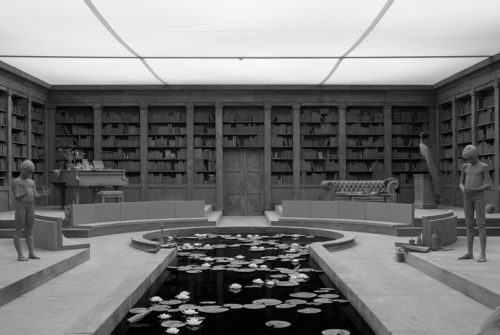
Hans Op de Beeck
There is an intersection here with the overtly political, or rather there are now no ways in which to talk about culture that do not bleed immediately into political theory and the social trauma of today. The emotional crises of the contemporary West is expressed by the devalued artistic creations one sees in all mediums. And perhaps paradoxically, and perhaps not, there is also a rise in very significant art and also a growing reevaluation of older works and of history. There is a clear but transparent revisionism being manufactured by the state, certainly by the U.S. government, while also a growth of new work that is — often even without realizing or intending it — counter Imperialist, anti conformist, and anti authoritarian.
I wrote about architecture a couple years back. “Looking at contemporary architecture, the face of advanced western Capital is the Trump Tower (any of them) but also it is the latent violence of the gentrifier, of the interiors of Park Avenue apartments and penthouses, and then finally, the strip malls and industrial parks that are scattered across the U.S. Nothing is to be found or read in the latest prestige architectural project of Norman Foster, or Herzog & de Meuron, or Aecom or Gensler or Renzo Piano or I.M. Pei. For none of these firms or architects are building from within a culture or even society. They are operative in a realm of exclusive wealth for patrons that have little interest in the equality of the future, or to in any ways lessen the suffering of those beneath the boot heel of the system that pays them. They build the architectural version of academic discourse, today. Structures that utilize private visual vocabularies, in a sense, that produce an effect of almost intentional purposelessness. They are buildings of futility, in one way, but of exclusion in another.”

Frederick Evans, photography (Wells Cathedral, 1903).
This is partly why architecture is such a perfect subject for class analysis (as Tarfuri noted). In theatre something else occurs. For there is no private vocabulary. Not for the approved production. But there is the ghost of exclusion. And part of this has to do with the fact that our psychic make-up resembles a stage (or vice versa). And this touches on something that is part of an overview I want to somehow outline. The ways in which Western history has increasingly deformed an ability for experience. Or more exactly an experience of ourselves as part of Nature (or reality or the world…take your pick).
“Though ubiquitous, excrement was still defiling. And if the omnipresent foul odors of excreta and decay must have led to some inurement to them, inurement was never so complete as to prevent stench, and primarily the stench of excrement and decay, from becoming the defining essence of sin. Sin stank; and therefore hell was imagined as an enormous privy…”
William Ian Miller (Anatomy of Disgust)

Frescos, Church of Santa Maria foris portas. 10th century. (detail)
Richard Sugg wrote a fascinating book Mummies, Cannibals and Vampires: the History of Corpse Medicine from the Renaissance to the Victorians in which he outlines the forgotten history of *corpse medicine* in the Middle Ages. But it is more than that, actually. It charts the early pre-modern idea of emotional formation. Of religious belief and of attitudes toward death. And in contemporary Western society there is a curious return to pre-modern sensibilities, a latent desire surfacing from out of the crises of belief and the erosion of imagination.
It was Heraclitus who wrote “the king whose oracle is at Delphi: he does not say, and he does not conceal—he gives a sign.” For Heraclitus, of whose work very little remains, who seemed to first argue against an idea of fixed meaning. Thinking about the Pre Socratics is always interesting because it provides a glimpse into a world much younger and smaller than today. While its true the Greeks gradually developed a sense of historical time and their place in it, their philosophy generally examines this idea in very limited ways. But Heraclitus also was a precursor to Greek tragedy.

Eberhard Havekost
Bernard Williams (who I should add is a just wonderful writer of English, beyond his achievements as a philosopher) writing of Parmenides …“Once the uniqueness of ‘it’ is seen to be a conclusion of Parmenides’ argument, and not (as some earlier scholars supposed) a premiss, the question of what ‘it’ is lapses. It is just that thing, whatever it is, that we are thinking and speaking of, when we succeed in thinking and speaking of something—and Parmenides certainly supposes that we can think and speak of something, though very evidently it is not what, in our everyday error, we take ourselves to be thinking and speaking of.”
I go into all this because it leads to another perspective on the evolution of (what the Frankfurt thinkers called) instrumental thought. And I continue to see the current states of unreality to be connected to the current strip mined version of instrumental thinking that one finds in, especially, the U.S. today. The digital age has obviously shaped our subjectivity, but it has done more than that.

Jana Euler
“Our digital condition is marked precisely by a new form of rationality that centers on matching each and every one of us, individually, to our twin—to find, for each of us, our other half. Not just to identify—we mastered and surpassed that in the twentieth century— but to match. It is what I would call a doppelgänger logic: Find the person who fits our consumption patterns and digital behavior, and use that person to anticipate our every action, in a back- and- forth manner, constantly chasing the trace of the last digital click. Record what the other person is searching on the web, which items he is buying, which books he is reading, which sites he is surfing—in sum, know what he wants, in order to predict what the other will want.This new rationality suffuses the digital age.”
Bernard E. Harcourt
In the 20th century, statistical analysis and probability studies were based on group behaviour. People were lumped into groups based on categorical logic and actuarial method. But with rise of digital computation, and (per Harcourt) data control there was developed new logics of prediction and what Harcourt calls (by way of Deleuze) a *desire machhine*. And this is no small part of today’s unreality. And this is, of course, rather obvious I think. But one of the problems is that without any sense of class awareness the techno experts and critics only recycle the very thing they are trying to critique (or applaud and promote).

Daisuke Ohba
Let me quote Harcourt again..
“The actuarial logic that emerged so robustly at the turn of the twentieth century re- oriented thought—or what we might call dispositions of the mind— toward the group and classification, toward categorical ways of seeing. The use of actuarial tables extended rapidly from the narrow realm of the insurance industry and nascent workmen’s compensation systems to many other domains, ranging from criminology and delinquency studies to the prediction of divorce outcomes, employment, and so on. These developments were founded on a logic of group identification.”
As Ian Hacking noted (quote by Harcourt) human nature was replaced by a new category, the normal. The normal person. But the normal implies the abnormal. And the predictive sciences soon shifted (because of the state’s general desire for control) focus to abnormality and the dangerous. The delinquent and subversive, the realms of the criminal and the mad. Much of this was driven by the simultaneous rise of a risk averse economic system. Economic but soon also psychological and political. Prediction meant insurance. And this also meant a kind of political statistical analysis bent on group pacification. Harcourt and Hacking both saw the shift was from group behavior to one of relations between individuals. I think this, however, only partly true. Not that those involved in these disciplines did not believe it, but that they were in some measure self deluding. The main thrust came out of the U.S. military and its systems analysis, and by extension then groups like the RAND corporation and Harvard Business School. But my point here is that all of this thinking was moving toward ever narrower ideas of what the human meant. It was the disenchantment of society as Adorno put it.
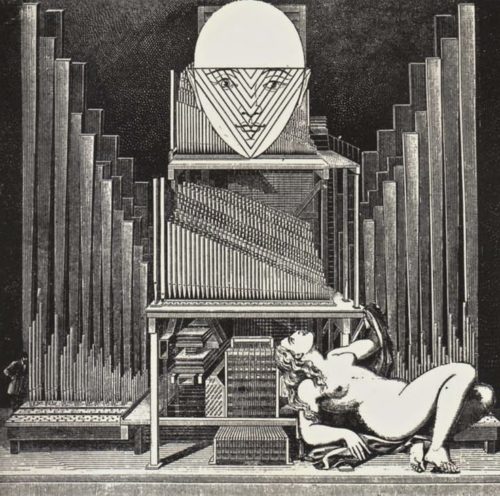
Max Ernst
Relations between individuals, but those individuals were defined, still, by group behaviour.
“The drive for data and computational power during the Cold War would have profound transformative effects on ways of thinking, on forms of rationality. It would induce a foundational shift from a group based, actuarial logic to an individualized, “fitted” way of thinking, associated with multivariate regression analysis.”
Bernard H. Harcourt
This was Robert McNamara and his influence on the Pentagon. And later Netflix and Amazon and facebook. And all of it gives an illusion of precision and success. But it is only an illusion. And it is illusory because any result will be the correct result. Netflix can say we know what you watched and scrolled through, therefore we can provide you with choices based on that metadata. But this presupposes that my desires are even known to myself, which often they are not. My choices are governed by things even I am not aware of, nor do they suggest even remotely that I find this to be satisfying. And there is an inherent tendency in Capitalist driven profit based policy that will privilege that which is seen to offer both risk management and control of the future. This is not to say we are not all effected by what Facebook calls “lookalike” audiences — its just that there is never a wrong answer to such thinking. And that is because the human is erased. The normal is behavioural in a very very very narrow sense of the word. Netflix can claim to know you better than you know yourself, but that’s not true. They know certain tendencies you, or anyone, have and they can in a broad sense predict certain general tendencies. But I could do that without computational analysis long before any of this. So could you.

Mizokoshi Takeshi, photography.
The loss of privacy and anonymity has been part of a great bargain in which the digital overlords reward passivity. Consumers accept surveillance and data mining if they feel they get something in return. But that is overly simplistic. Surveys indicate people in the West accept the loss of privacy because they believe in the market logic of advanced capital. But such surveys are meaningless, finally, because they are not really about what people feel — but only how they answer questions in surveys. The loss of the human is real, but it is neither complete nor is it even more than another aspect of the hologram reality people of the affluent west live in — and that hologram aspect is delusional. It is unreal. And it teeters all the time on a kind of madness.
“…what the solipsist means is quite correct; only it cannot be said but makes itself manifest. The world is my world: this is manifest in the fact that the limits of language (of that language which alone I understand) mean the limits of my world.”
Wittgenstein (Tractatus)
This is eerily close to several Pre-Socratic fragments. From Heraclitus to Gorgias of Leontini who lost work was titled On What is Not. And it brings me back to theatre, in a roundabout sort of way. For theatre is, as I’ve said before, impossible. And this is what Tarfuri said of architecture. Wittgenstein also remarked that ‘we cannot think what we cannot think, and therefore we cannot think what we cannot say’. Theatre is the art form of signs, in a sense. It is the revealing of what we cannot say. And this in turn brings us to this discussion of emotional adumbration — the stunted emotional of internet systems analysis. The subject who is not a subject.

TheAntinous Mondragon, marble, 130 AD.
“Surveillance had a French pedigree and descended from French techniques of internment and confinement. Control, by contrast, drew its heritage from English procedures of moral control. “
Bernard E. Harcourt
The U.S. instinctively trended toward the moral Puritanical in all disciplinary policy. And this is only worth mentioning because of the lingering internalization of the Master by most Americans. The normal (sic) American identifies with uniformed authority especially. Discipline was crucial for the growth of Capitalism. So, to bring this back to an idea of the unreal one has to examine what is, at bottom, the assumptions of the human involved in the growth of both the carceral system and digital surveillance and data processing. The ideas of this predictive science, based on computational data processing and actuarial methods, still must begin with an idea of what constitutes an individual. Except I’m not sure that they do.

James Bridle. Image from Google Satellite camera. Chicago, Il.
But this is my meandering way of returning to both art and theatre, and to the unreality of the West’s increasingly fascistic state. And Wittgenstein, however gnomic and enigmatic he may be, is very worth reading on ideas related to solipsism. And somehow the information stroke surveillance state is shadowed by the spectre (sic) of a solipsistic view of reality and of the self. The predictive algorithms of Facebook or Google do not really have a theory of the self. They simply compile data and analyse it and made adjustments to manipulate the viewer or user of their media. Everything from NSA and Homeland Security, to privitized data mining, begins with internet user history, not with an idea of the human being. The human is ever more remote from consciousness, and the internalizing of surveillance systems and private security, as well as social media platforms, is a not insigificant contributor to this new form of psychically stultified narcissist. Everything is there for me, except there is no me. Theatre on the other hand begins with an idea of the human. The human on a stage.
“Contempt, it turns out, was assimilable to democracy. In fact, rather than subverting democracy, it assisted it by making generally available to the low as well as to the high a strategy of indifference in the treatment of others. Contempt thus came to underwrite the basic minimal respect for persons so crucial to democracy, the style of tolerance captured by the saying “live and let live.” Disgust, ( ) …is a much more powerful anti-democratic force, subverting the minimal demands of tolerance.”
William Ian Miller

Laurent Berges, photography.
Contempt is closely aligned with pity, but also with smugness and scorn. And the role of social media looms large in the development of a society of sneering and snarky ironic hostility, but also with aggressive pity and with derision. And this in turn with laughter. The post modern narcissist is one prone to a kind of derisive laughter, and it may be that all laughter is now tinged with this aggression. Contempt implies superiority. I have noticed, over say the last forty years, a drastic increase when speaking, whether to one or several people, that even if, in theory, listening, people will often not be looking at you. It is a kind of show of indifference, but a pathological one. But pathological only in the sense that the listener here is often barely if at all aware that he or she is not keeping visual contact. It is often involuntary.
“So what we have is a kind of feedback loop in which contempt helps create and sustain the structures which generate the capacity for contempt.”
William Ian Miller
Miller also points out that the facial expressions of contempt are closely associated with irony. Disgust on the other hand is closer to horror and revulsion. And disgust is also related to status and rank, but it incorporates far more notions of sin and moral decay, of good and evil. Disgust is the response to the unimaginable. And it perhaps an open question why exactly the U.S. and Hollywood today produce so much Horror material; for horror is first cousin to disgust. There is, presumably, a need for mock disgust. For practice in responding with appropriate horror and disgust and loathing. It is a strategy for personal management of the horror of the outside world.

Johan Willner, photography.
Irony, on the other hand, has engendered a kind of ‘irony fatigue’. The young in particular are over ironized. They can no longer tolerate their own surplus irony. And the result is a kind of creeping emotional blankness. Disgust is accompanied, often, with fear of pollution. Fear of contamination and hence it is a serviceable ally of fascist and authoritarian systems.
“With the concept of narcissism, a second configuration of the drives emerges in the analysis of what Freud called narcissistic neuroses or paraphrenias (paranoid delusions, megalomania, schizophrenia and melancholia). In these cases, the ego, which until then he had considered only an agent of repression, opposed to the sexual drives, appeared to be itself an object of love (as in self-love). This meant that ‘the instincts of self-preservation were also of a libidinal nature: they were sexual instincts which, instead of external objects, had taken the subject’s own ego as an object’”
Teresa de Lauretis
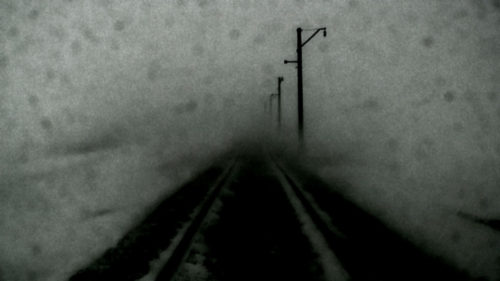
Darren Almond, photography.
Contempt is differentiated from disgust partly by this idea of pollution from below. Contempt also, as Miller notes, can move upward. But upward contempt is usually driven by either resentment, or more often by a kind of righteous indignation and hatred. So class perspective is important in trying to tweeze apart the new unreality. (It is, as an aside, perhaps a good time to view again the Losey/Pinter film Servant). Miller notes toward the end that the real battle for equality is fought in the emotional economy. And here theatre seems the most disruptive of mediums, partly because everything is experienced as a kind of theatre. The same, to a lesser degree, with architecture. And here it is impossible not to mention at least the role of the sentimental in both architecture and theatre, but really in all cultural products. (a second side bar, the recent Netflix show Seven Seconds, created by Veena Sud, is probably the best show on police violence and the criminal justice system in a very long time. And its greatest virtue is a total lack of sentimentality). Now, it is important here to digress just a moment (again) and quote Jean Laplanche on Freud’s discussion of infant sexuality….
“The real object, milk, was the object of the [vital] function, which is virtually preordained to the world of satisfaction. Such is the real object which has been lost, but the object linked to the autoerotic turn, the breast – become a fantasmatic breast – is, for its part, the object of the sexual drive … . The object to be rediscovered is not the lost object, but its substitute by displacement; the lost object is the object of self-preservation, of hunger, and the object one seeks to refind in sexuality is an object displaced in relation to that first object. From this, of course, arises the impossibility of ultimately ever rediscovering the object, since the object which has been lost is not the same as that which is to be rediscovered.”
The impossibility of refinding that which was lost. This is suggestive of the schematic of desire — and forms a blueprint for one register in which artworks are experienced.
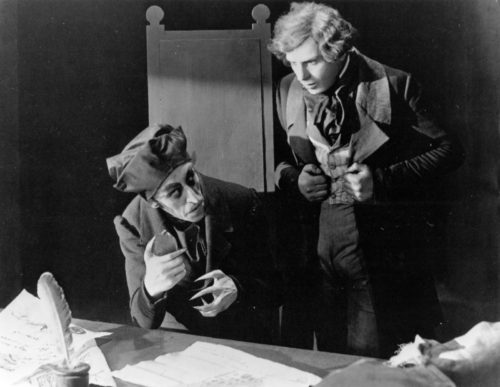
Nosferatu (1922. : F. W. Murnau, dr.)
“In humans, then, unlike vampires, hunger and love, the instinct of nutrition and the sexual drive, are not on the same continuum: while the first is biologically driven, the second is powered by the (typically unconscious) fantasy of finding a lost object of satisfaction and its promise of a perfect state of bliss. And here perhaps is the reason for the attraction we feel to the figure of the vampire: it gives expression to that fantasy, our wish for a time, at the origin of life, in which hunger and love were satisfied at once, the time forever unrecoverable of an unmediated contact with the real.”
Teresa de Lauretis
In theatre there is always a strong sense of the mimetic re-narrating going on in the viewer. Far more than in film, and that is a curious truth worth a long discussion (and I’ve written about it here). But theatre, in a sense, cannot be avoided. And in these ad hoc narratives that present themselves as theatre (or once did, for increasingly the subjective is fragmented and taking place on the imaginary screen in our mind. A psychic drama without human actors, but only representations. One could say all mental activity is dealing with representations, and that’s true, but the screen figures are closer to cartoons than to actors on a stage. And the screen erases space; the stage is gone and replaced with a wall to be scanned) the role of disgust and horror are not insignificant. For disgust with its religious and moral character allows for punishment of the offending lower classes. Workers smell, and that smell soon is assigned the quality of a moral flaw. The transgressive odor of the poor is then associated with sin, and with criminality. Disgust at the mad is also characteristic of the bourgeoisie. It is mediated with pity, of course. But pity is so often sadistic. Disgust justifies cruelty. And here, again as Miller observes, antisemitism is part of this geometry of emotions. The Jew is associated with money and usury, and money is filth, is shit, and smells. And sexuality — both Jews and Blacks, as well as Asians carry sexual stigmatizing. The outsize sexual appetite and the lack of hygiene go hand and hand. The misogyny of the hierarchical make up of Western societies meant all of the underclass were perceived as sharing qualities that were feminine. The heightened masculinity of the physical labourer contained within it the outlines of the feminine (true of Brando and bullfighters and a host of other examples). Women of the upper classes were seen as always tempted by the sinful sexuality of those deemed disgusting. But here the calculus of disgust and contempt become mediated by the tendency for self loathing, by fear. The upper classes secretly were drawn to the filth. This relates to the fact that disgust, unlike contempt, has a stronger and clearer material base. There must be something concrete which smells or can be seen as offensive. The teenage girls who are drawn to *bad boys* is a kitsch sort of reenactment of a colonial drama of sado masochism. But it also simply that over time the culture of the west became over sanitized and drained of life. And increasingly abstract in a sense. The underclasses, even if disgusting, were alive and not dead. The upper class are the actual vampires. They are not alive, but sustained by sucking the blood of the underclass.
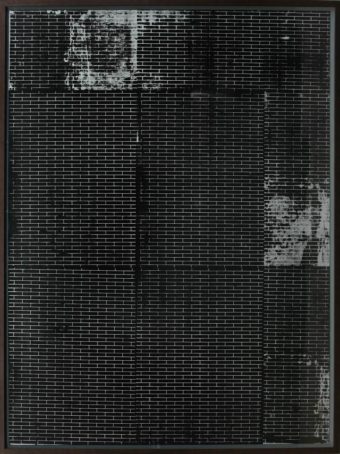
Maria Taniguchi
“In the later eighteenth century, the French physician M. Geoffroy knew of one ‘“lady of high standing, who relied on stercorary fluid to keep her complexion the most beautiful in the world until a very advanced age. She retained a healthy young man in her service whose sole duty was to answer nature’s call in a special basin of tin-plated copper with a very tight lid”’. This was covered so that none of the contents could evaporate. When the shit had cooled, the young man collected the moisture which had formed under the lid of the basin. ‘“This precious elixir was then poured into a flask that was kept on Madame’s dressing table. Every day, without fail, this lady would wash her hands and face in the fragrant liquid; she had uncovered the secret to being beautiful for an entire lifetime”’.202 Here we once again encounter a kind of alchemy of excrement, tinged in this case with the quasi-vampiric desire to absorb the powers of the young and vigorous (compare Ficino’s idea about youthful blood for the elderly).”
Richard Sugg
The learned blankness — for now in at least the second generation of the digital age has meant children have lost early contact with faces and gestures and have a growing deformation of how they process time.

Mary Heilmann
“Online interactions aren’t just different from real-world interactions; they’re measurably worse. Humans learn empathy and understanding by watching how their actions affect other people. Empathy can’t flourish without immediate feedback, and it’s a very slow-developing skill. One analysis of seventy-two studies found that empathy has declined among college students between 1979 and 2009. They’re less likely to take the perspective of other people, and show less concern for others. The problem is bad among boys, but it’s worse among girls. According to one study, one in three teenage girls say that people their age are mostly unkind to one another on social network sites. ”
Adam Alter
One of the things rarely discussed in the context of education and online addictions is reading. And not just reading, but the fact that increasingly the working class is discouraged from reading difficult material. I wonder if the curriculum of today’s high schools began to include courses on logic and philosophy, on the history of ideas, what would happen. Why cant seventeen year olds red Wittgensein? I suspect they would understand him far better than I do, in fact. The digital hegemon teaches students to fear text. And there is such a deeply entrenched notion of practicality that such ideas as a Wittgenstein worked with are immediately derided as pointless. Today, film and TV reproduce the same childish and simplistic narratives of state violence and racism. And smart phones are the primary means for communication. It is a society who has lost utterly the connection to even the material sources of disgust. Emotional life cannot even rise to that level. There is contempt, or a form of something like it, and there is irony and certainly shaming. Social media is the perfect mechanism for releasing resentment and anger, without worrying about a face to face reaction. And increasingly the idea of faces is disappearing. By which I mean people are less able to remember faces, or to care about them when they do remember. But they don’t really remember much either. While there is a pronounced reaction to this, and resistance, the overriding reality for mass America is one of emotional paralysis. The unpopularity of theatre (except for giant musicals that imitate cinema) speaks to the redemptive power of theatre, or rather the potential for it. And while architecture carries much of the same insistence on the human, and while it also is a stage on which drama and narrative unfold, it is not of the same immediacy as theatre. Theatre is today, in the U.S. certainly, in the hands of narrow minded shop keepers of culture, university deadened and self hating. But even under their callus stupidity, there remains something radical that happens whenever an actor steps into that space that is then a stage.
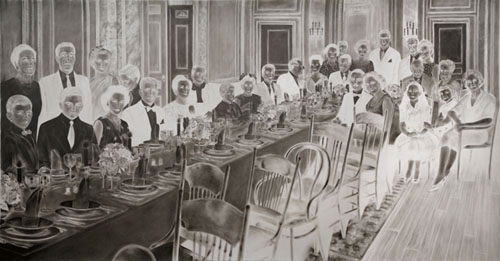
Anthony Goicolea, photography.
“The word blood is a particularly striking example of such a shift of meaning, since it is a substance with which, as it swings to and fro from heart and lung at the centre to visible complexion and sensitive skin at the periphery, we can still in some measure feel ourselves to be united by an extra-sensory link. We can, for example, both feel within ourselves and see through the curtain of another’s flesh how instantly it answers to fear and shame. Thus, we still partici- pate ‘originally’ in our own blood up to the very moment when it becomes phenomenal by being shed. From that moment on, we abandon it to the mechanomorphism which characterizes all our phenomena. For us—that is, for our casual awareness, though not for our scientific concepts there are really two kinds ofblood: the shed and the unshed; rather as for Galen there were two kinds of blood, the venous and the arterial. Both of Galen’s were participated; whereas only one of ours is. We refer to what remains of that participation when we speak, with a psychological intention, of ‘bad blood’ or ‘hot blood’. We no longer distinguish where he did. We do distinguish where he did not, polarizing the old meaning of blood into two, a metaphorical and a literal one. And our medicine interests itself almost exclusively in the literal one, that is, in the idol.”
Owen Barfield (Saving the Appearances: A Study in Idolatry)
The Romans beheaded enemies or traitors and stuck the heads on poles just outside the city. Visitors, traders and others were greeted by sightless eyes on rotting skulls, looking down on them. The gates to the city were surveilled then, too. In a world of metaphor and also a world of vastly more concrete symbolism.

Nancy Haynes
There is now a paypal button at the top of the page for anyone caring to donate to this site. Much appreciate those who do.

Can’t believe there’s been no comments on this one, great work here John!